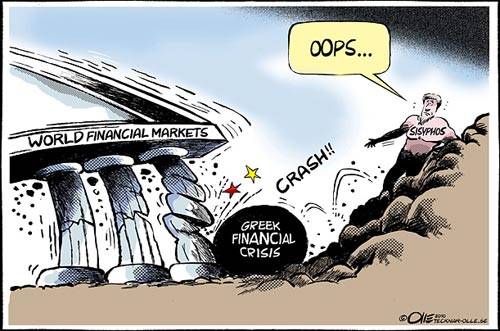Photo: Vima
Greece has money to cover the costs of salaries, pensions and health services until 15 July this year, warned Minister of Finance Yiannis Zaniyas. The negative trend in revenue collection from taxes should change, said the Minister. According to the information published in Greek media, the ready money available to the government is now two billion euro and the current cash deficit for the first five months of the year is slightly over five million. Two billion euro is expected to be spent for the pensions and salaries of civil servants. The Ministry of Finance stated that during the first week of June, tax services have fulfilled the objectives of collecting taxes, but there were serious deviations in May and April. Last month, 666 million euro less than budgeted were collected and in April, the difference was 334 million.
A special committee of SYRIZA visited the office of Zanyas in the Ministry of Finance this week to inquire about the current economic situation of the country. Radical leftists continue to insist that Greece does not need the Memorandum of financial assistance, but their leader Alexis Tsipras has taken moderate positions to Brussels. In his official pre-election press conference, he said that Greece will cancel the bailout agreement and will provide a national programme of reform to be agreed with European partners. He said redundancy in the public sector was impossible but did not exclude the transfer of positions where necessary. Appointments, however, were out of question, he said, which fully contradicts his previous election campaign in May.
"The election dilemma is whether Greece will remain in the European community or not," stated former Prime Minister Constantine Mitsotakis, who was invited by Sky to comment on the political situation in the country. He was clear that the only chance for Greece is to find a united government composed of technocrats and pro-European political forces. As for the comparison of Tsipras to Andrea Papandreou, Mitsotakis stated that the young leader is a distant shadow of Papandreou-father. The first and main difference is that Papandreou was a well-educated economist, had 48% of the electoral vote of the Greeks in the 1980's and was able to establish an independent government. Papandreou made many promises too, said the honorary president of New Democracy, but he kept them. This could not happen with Tsipras, Mitsotakis said.
Meanwhile, Greece is still looking for small, short-term and costly loans from foreign markets to cover its pressing domestic expenditure. On Tuesday, the Public Debt Management Agency held an auction of six-month government bonds and collected a total of 1.63 billion euro at an interest rate of 4.73%. The interest rate of the same type of securities traded earlier this year was 4.69%. And while Greece is sinking, Moody's rating agency announced the one-point downgrading of the two largest banks in Cyprus (Bank of Cyprus and Hellenic Bank). It cut their rating from B1 to B2 because of a high risk of a Greek exit from the euro area. The higher risk of exiting the euro area could lead to increased withdrawal of deposits from the branches of Greek banks in Cyprus, which will put pressure on the liquidity of all banks, the agency stated.
Fewer analysts believe that Greece could be saved within the euro. The crisis dragged on too long and the lack of rapid response outside and inside the country has driven its spread. Joseph Siglits said the rescue plan for Spanish banks had failed and Nouriel Roubini, known in financial circles as Dr. Doom, believes that the return to the drachma is inevitable. The question is whether it will happen gradually and smoothly or through an uncontrolled default. He assessed that the exit of Greece should happen by the end of this year or not later than 2013. Financial expert Gemma Godfrey published in his social network profile a comment describing the effect of the Greek crisis: "Actions speak louder than words: Greece causes serious fluctuations in the markets, but the irony that she gave the world the word - a cycle."
